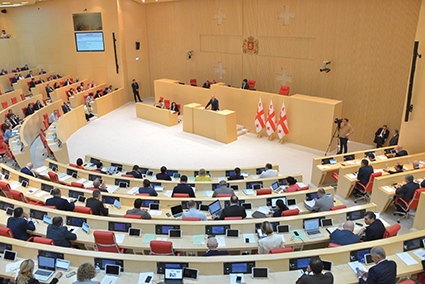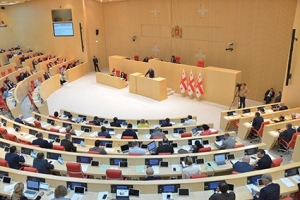Monitoring Reveals Parliament’s Activities Have Become More Transparent
Non-Governmental Organization Transparency International (TI) Georgia has published the results of the assessment of the 9th convocation of the Parliament of Georgia, which reads that parliament’s activities aimed at increasing transparency have merited a positive assessment.
The report, which covers the period from November 18, 2016 to December 31, 2017, reads that unlike previous convocations, no plenary session was halted due to the absence of a quorum.
“Parliament started reviewing the government reports on the state of enforcement of the decisions and resolutions made against Georgia by the corresponding committee of the United Nations Organization and the European Court of Human Rights,” the NGO says, adding that unlike the Parliament of the previous convocations, the Gender Equality Council has also been more active.
The TI underlined that the involvement of civil society in the election of public officials has been strengthened, noting as an example, “The candidacy for the post of Public Defender was selected based on consultations with civil society representatives.”
Among the positive trends, it was noted that the representatives of the executive branch attend committee sessions and present periodic reports on their activities. Committees held 133 sessions in this regard.
“During the first year of Parliament of the 9th Convocation, MPs were more active in proposing legislative initiatives. During the period, covered by the report, 92 MPs exercised this right,” the NGO says.
Among the activities of the lawmakers, it was noted that the parliamentary opposition boycotted the work of the Parliament five times and did not participate in the plenary sessions seven times.
The Georgian President returned legislative initiatives to the Parliament five times with motivated remarks, but the MPs did not take his notes into account and in all cases, the Parliament overrode the vetoes.
Despite significantly increased transparency and MP activity, the NGO also highlighted some negative trends. According to the report, the situation has worsened with regard to the systematic speeding up of the hearing of draft laws, without good reason. The Parliament of the 8th Convocation fast-tracked the hearing of 437 draft laws, while the Parliament of the 9th Convocation fast-tracked 213 draft laws in the first year alone.
“Postponing of the activation of adopted laws also represents a problem. Parliament discussed a simplified procedure and adopted 77 such draft laws,” the TI stressed, adding the activities of working groups in some cases were formal and group members were not involved in the process of elaboration of draft laws.
The negative trends read that MPs do not make proper use of the possibilities of oversight over the executive branch. According to the report, in the given period, no investigative commission was established to investigate such important cases as the abduction of Azeri journalist Afgan Mukhtarli from Tbilisi or the beating of former Auditor General Lasha Tordia.
Missing plenary sessions and violation of norms of ethics, sometimes with the participation of representatives of the executive branch, were also listed among the negative trends.
Transparency International underlines that the Georgian Parliament has not yet adopted a Code of Ethics for MPs, which would regulate such issues.
“MPs fill out asset declarations incorrectly, failing, in some cases, to indicate company shares that they own. Several MPs also hold the positions of company directors,” the NGO added.
The report also lists some negative and positive laws, adopted by the 9th Convocation Parliament in the reporting period.
The positively assessed laws are:
• Amendments resulting from ratification of the Istanbul Convention,
• Changes in the procedure of submitting asset declarations,
• Amendments to the Imprisonment Code,
• Abolition of Simplified Electronic Tenders,
• Initiative on banning tobacco smoking in buildings, public areas and transport.
Amendments which NGOs assessed negatively:
• Creation of an operative-technical agency,
• Moratorium on the sale of land,
• Abolition of self-government entities,
• New rule for staffing election commissions,
• Changes to the rule of debating legislative proposals.
Legislative amendments which require improvement are:
• The Third Wave of Judicial Reform,
• Road Safety Reform,
• New Regulations Concerning Remuneration in Civil Service.
By Thea Morrison












